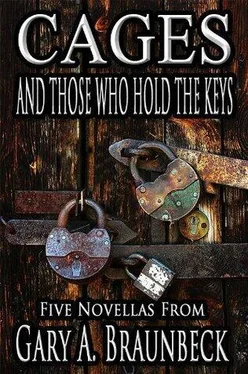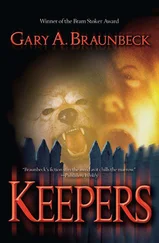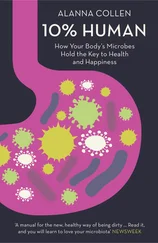“I once met a schizophrenic who described what it felt like when he wasn’t on his medication. He said it was as if all of his nerves had been plugged into every electrical appliance in the house and someone had set those appliances to run full-blast. That’s what it was like for me that day in the graveyard. For one moment all life everywhere was functioning at its peak and I was ‘plugged into’ everything—but only as long as this music deemed me worthy of possession.”
I began shaking my head; slowly, at first, then with more determination, in order to rid my ears— both my ears—of a buzzing pressure that was growing inside my skull.
Knight continued: “I managed to pull my head up and look at the beggar woman. She had reached over and taken the violin with the broken neck and was holding it against the baby—both the dead infant and the instrument were slick with her blood—and she made the smallest movement with her head, a quick, sharp, sideways jerk that I knew meant ‘Come closer.’ I leaned over until my ear was nearly touching her lips and I heard her whisper three words: ‘Shakti. Kichar admi.’ It wasn’t until later, when I’d gotten back to the set and asked one of the Indian crew members about it, that I found out what ‘Shakti’ meant: Creative intelligence, beauty & power. The cosmic energies as perceived in Hindu mysticism, given to mankind by Brahma, Vishnu, and Shiva so it might know some small part of what it feels like to be a god.
“Then she pushed me away with surprising strength. I fell backwards onto my ass and felt the music wrenched from my chest. I was suddenly separate from all of them, from the earth, my own flesh, the glow of the setting sun; the surrounding life had withdrawn from me, unplugged itself. I was being asked to leave, so I did. With their glorious music still spinning in the air behind me, I moved toward the road and did not look back until I was well past the gates.”
The smoke-players began to reverently shift their positions. I rubbed my temples and turned my head to the side; not only was I hearing the song Knight had described, but underneath it was the cumulative babble of a million whispering voices speaking in as many different languages.
“As soon as I stepped from the cemetery I heard a new sound join the music, a lone, sustained note that floated above everything, a mournful cry that sang of ill-founded dreams and sorrowful partings and dusty myths from ages long gone by, then progressively rose in pitch to soften this extraordinary melancholy with promises of joy and wonder—‘I AM light’s fullest dimension, I AM light’s richest intention, I AM, I AM, I AM the light!’—and I turned for one more look, one last drinking in of this gloriously odd, golden moment, and I saw the child standing in the midst of the musicians, such a beautiful child, the violin tucked firmly under his chin. He looked at me and smiled a smile unlike any that had been smiled before, full of riddles and mischief and answers and glee, and in that smile I knew his name: Shakti . He was giving me a final chord, a last bit of the music to remember for the rest of my life, and in that last moment he opened me up to the majestic cacophony to such a degree that I heard…Jesus Christ, I heard everything .
“I ran. It was the only thing I could think to do to break this hold on me. I turned and ran back toward the film set. And even though it seemed that every person I passed on the road wore the beggar woman’s face or was clutching a dead infant to their chest or was in some way sick or damaged, I felt…elated. I know that must sound crazier than a soup sandwich, but I knew all of these people, with their lips that muttered mercy and their tears that never ceased, were walking toward the cemetery where the pain and sadness would be lifted from their eyes, and that I was being watched over by a child of wonder who would always be waiting at the entrance to my secret world. “And all of them said the same thing to me as they passed by. ‘Kichar admi.’” “Did you ever find out what that meant?” He nodded, then strummed the guitar once again. “’Mudman.’” “Holy shit.”
“Yeah.” He began playing the opening to “Kiss of the Mudman”, that almost-traditional 12-bar blues riff where you can tell something is just a bit off but can’t put your finger on it.
“What is the Mudman supposed to be?” I asked him.
“I always figured it was just another name for Kshetrapala, but later, when I woke up in the middle of the night after me and Veronique had practically went through the floor with our fucking, I thought…man, I thought, what better way to describe what it feels like after you wake up from a night of excess. The taste of booze in your mouth, maybe a little puke-burp rolling around in the back of your throat, your body aching, your head splitting, your face feeling like a glazed donut from going down on wet pussy…excess. You wake feeling like you got kissed by the Mudman.”
He stopped playing. “I was still hearing that song they had been singing, so I picked up my guitar and started fooling around with it, and I realized that what they’d been singing was…I don’t know if this’ll make sense…but they’d been singing something like an inverted traditional blues riff.”
He played it again, and this time I heard it, the off-thing, a single note in the middle of the riff that didn’t seem to fit.
“The progression seemed so logical,” said Knight. “Leave the G string alone—tuned to G, of course—so the high and low E strings go down a half step to E flat. The B string goes down a half step to B flat, the A and D go up a half step, to B flat and E flat. The result was an open E flat major chord, which made easy work of the central riff. For the intro, I started on the 12th fret, pressing the 1st and 3rd strings down, dropped down to the 7th and 8th fret on those same strings for the next chord, and continued down the neck...as the progression moved to the 4th string, more and more notes were left out and it became a disguised version of a typical blues riff. The idea was to have a rush of notes to sort of clear the palette, not open the back door to Hell...but that’s a road paved with good intentions, isn’t it?”
“What do you mean, open the back door to Hell?”
“The Mudman, dude. Whatever name you wanna give him, he’s real . He is Shakti’s shadow. He feeds on creative energy, and when that energy runs out, he feeds on the person who used to carry it. And this series of notes—” He played the opening again, only much slower. “—is his invitation to enter this world. Not at this tempo, it’s got to be a little faster.”
“How do you know this?”
He grinned. “Because I called him up by accident one night. I’d just finished the first leg of my solo tour, and I was bored out of my skull at the hotel at three in the morning, so I started fiddling with the riff, and I increased its tempo and…there he was.” He set aside his guitar and opened his shirt. The middle of chest was a mass of scar tissue.
“Fucker tried to take a piece out of me, Sam. That’s why the police found all the blood and that section of my flesh in the hotel room. The Mudman demanded a sacrifice from me, and I wasn’t ready to make it.” He buttoned up his shirt and picked up his guitar once again.
“I’ve been running away from him ever since. But I’m too sick now. I can’t run any more.”
I scratched at my dead ear. “So why are…why are the others out there looking for you?”
“Because they’ve been kissed by him. He devoured all their creative energies, then chewed up what was left. That’s how he works, Sam. He finds someone who’s really creative, and he feeds on their energy, all the while giving them too many temptations, access to too many excesses, because that way, their energies will be spent faster. He gorges himself on their energy, then eats them for the dessert. What you’ve got out there, those are the ulcerations that remain, the aftertastes, the memories of the legends.”
Читать дальше












